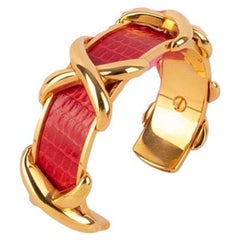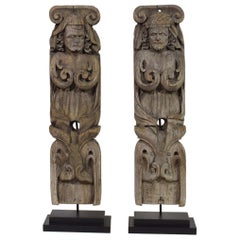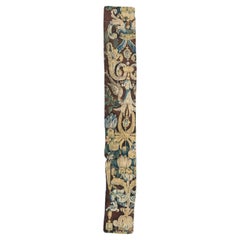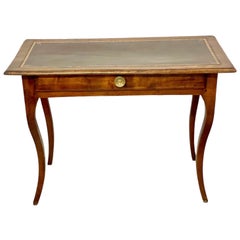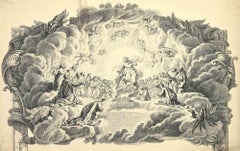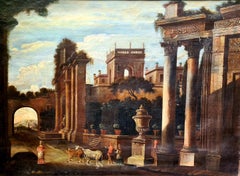France
to
344
3,528
28,315
17,843
50,755
39,880
25,156
21,730
16,541
10,506
7,715
6,770
6,486
4,721
4,378
3,913
3,528
2,927
2,828
2,757
2,674
2,194
2,192
1,674
1,145
926
889
771
747
722
705
592
522
502
473
366
357
288
176
165
151
139
123
102
96
83
60
50
48
47
43
41
35
35
29
27
26
14
13
12
10
8
7
7
3
3
73
66
50
40
28
Period: 18th Century and Earlier
Period: Late 18th Century
Hermès Red Exotic Lizard Leather Bracelet
By Hermès
Located in SAINT-OUEN-SUR-SEINE, FR
HERMÈS - (Made in France) Red exotic lizard leather bracelet with a golden finish.
Additional information:
Condition: Very good condition
Dimensions: Circumference: 12.5 cm - Openin...
Category
15th Century and Earlier Antique France
Pair of French 17th Century Weathered Oak Renaissance Ornaments
Located in Buisson, FR
Beautiful weathered oak Renaissance ornaments that most likely once adorned a half timbered house in Normandy.
France, 17th century. Weathered, small losses
Measurement here below a...
Category
17th Century French Renaissance Antique France
Materials
Oak
Pretty antique 17th century French Aubusson Tapestry fragment
Located in Saint Ouen, FR
"Exquisite fragment of a border of a French Aubusson tapestry from the middle of the 17th century, featuring a beautiful design of flowers and nice natural colours, entirely hand wov...
Category
Mid-17th Century French Aubusson Antique France
Materials
Wool, Silk
18th Century Narrow Writing Desk
Located in LA CIOTAT, FR
A narrow and elegant 18th century lady's desk, or writing table, in natural wood with embossed leather top, and a single frieze drawer. Raised on four slender cabriole legs, this pet...
Category
18th Century French Louis XV Antique France
Materials
Leather, Walnut
Appearance - Etching by C.N. Cochin the Elder - 1750s
Located in Roma, IT
Appearance is a black and white etching on cream-colored paper, realized by Charles-Nicolas Cochin the Elder (1688-1754) in 1750s.
Good condition.
Category
1750s Old Masters France
Materials
Etching
Grand Tour 18th Century Veduta Capriccio Painting, After Gennaro Greco
Located in Cotignac, FR
A fine, large 18th century veduta capriccio scene with temple ruins after Gennaro Greco from the circle of Pietro Cappelli. The painting is presented in a more modern carved gilt woo...
Category
18th Century Baroque France
Materials
Oil, Canvas
French 18th/ 19th Century Painting of Maria with Baby Jesus On Metal
Located in Buisson, FR
Very attractive painting of Maria with the baby Jesus. Painted on metal.
France circa 1800-1850
Weathered and small losses.
Category
18th Century French French Provincial Antique France
Materials
Metal
Late 15th Century Polychrome Wood Carving Depicting the Nativity
Located in Saint-Ouen, FR
While the birth of Christ is briefly told in the Gospel of Luke (2, 7) it is in the apocryphal texts that we find most of the elements and details that have then inspired artists. As of the 14th century and even more of the 15th century the subject of the Adoration of the Child replaces in Western art the scene of the Birth, much favoured in Byzantine art. Instead of being depicted lying with the new-born swathed in the manger, the Virgin is now kneeling, her hands joined in prayer in front of the naked child. This change was probably hastened by the popularity of the visions of Saint Bridget of Sweden to whom the Virgin allegedly appeared to show how she had given birth to Jesus (Visions, VII, chap. 21).
Sheltered by a thatch-roofed structure the Virgin is kneeling in front of the Child Jesus. She wears a magnificent red dress under a large gold cloak. Her curled blond hair is partially veiled. The newborn is lying on a straw mat. Joseph is depicted with a parted beard and stands opposite from the Virgin. He wears a tunic and a coat with a purse hanging from the belt. His costume reminds us of the long journey him and Mary have accomplished to reach Bethlehem.
Two other women are present. One is looking through the stable’s window to observe the Holy Family while another one kneels in prayer in front of the divine child. The rich costume of the lady might indicate she is a donator.
However they could also both represent the women who took part in the birth of Christ, Zelemi and Salome. Salome, incredulous did not believe in the virginal conception of Mary and she is represented far from the scene. The artist has depicted her with an expression of doubt on her face. Zelemi, on the contrary, is a believer. She is rewarded by a place of honour at the heart of the scene, close to Mary.
To the left the donkey and ox that have accompanied Mary and Joseph to Bethlehem observe quietly the scene.
On the foreground two angels hold a scroll reading an excerpt from the Gloria : “/Gloria/ in excelsis /Deo/.” One of the angels wears a blue cape while the other’s is red Those two colours are very significant as during Middle-Ages blue symbolises hope and red charity. Together they express the hope in redemption thanks to the advent of Christ and his sacrifice to come.
Above the main scene, up a cliff, a small shepherd lets his herd of sheep graze amidst the trees. He is framed by two walled cities.
This wood carving is the work of a very skilled and inventive artist. The piece bears witness to his exceptional talent. The realism of the scene is emphasised by the amount of details depicted. The refinement of the carving itself is highlighted by the well preserved polychromy.
This key moment of the New Testament is set in a contemporary context thanks to the clothes of the characters and the scenes of rural life. The universal dimension of the scene is intensified while allowing contemporary viewers to grasp its meaning more easily.
This care for details, the picturesque realism as well as the extraordinary rendition of the cloths suggest it was made by a Flemish artist during the late 15th century.
This relief can be compared with the panel of the Nativity from the Saint-Vaast altarpiece made by Jacques Daret between 1433 and 1435, today in Madrid’s Thyssen-Bronemisza Museum.
Literature
Louis Réau, Iconographie de l’Art chrétien...
Category
15th Century and Earlier Dutch Gothic Antique France
Materials
Wood
French Large Trunk- Chest - Gothic oak from the 16th century - France
Located in Beuzevillette, FR
Large solid oak chest from the 16th century Gothic period
Very pretty French, Norman work.
Decorated with Gothic motifs on 5 panels on the facade.
Note reassembly in the 18th and 19...
Category
16th Century French Gothic Antique France
Materials
Wood
Couple of 18th Century Italian Baroque Carved Wooden And Silvered Candlesticks
Located in Buisson, FR
Great pair of carved wooden candleholders with their beautiful silver leaf gilding.
Italy, circa 1750-1800.
Weathered and small losses and old repairs.
More photo's available on requ...
Category
18th Century Italian Baroque Antique France
Materials
Wood
Spanish 17th-18th Century Baroque Giltwood Ornament
Located in Buisson, FR
Beautiful gilded ornament. Well detailed with baroque fruit.
Spain circa 1650-1750
Weathered, small losses
Measurement here below of the largest piece and includes the wooden pedes...
Category
17th Century Spanish Baroque Antique France
Materials
Wood
15th Century Burgundian Low-Relief Depicting Scenes of the Nativity
Located in Saint-Ouen, FR
Provenance : In the same private collection for several generations, Burgundy.
The canonical Gospels describe briefly the episode of the Nativity. It comprises three parts :
• The Preludes : the Journey to Bethlehem, the Census
• The Nativity
• The Announce to the Shepherds and the Adoration of the Magi
Only the Gospel according to Matthew (2, 1-12) speaks about the Adoration of the Magi. Staying vague about their number it does say they brought the newborn gold, incense and myrrh. The apocryphals, the fathers of the Church and many other authors have filled in the gaps of the evangelic tale. The sobriety and symbolic of the story have been a huge inspiration to artists. Although one of the oldest depictions of the Adoration of the Magi dates from the 2nd century the theme became very popular in Christian art during the late 14th century. One of the reasons explaining this success is that it celebrates both the Virgin and Christ at the same time.
This important walnut panel is carved in a strong relief and depicts the different steps of the story of Jesus’ birth.
On the left, the donkey and ox that have accompanied Mary and Joseph from Bethlehem are depicted behind a trough. On the thatch roof appears the star that would guide the magi to the place of birth of Jesus.
Mary is wearing a veil and is seating on a bed. She holds her baby at arm’s length to present him to the magi. Saint Joseph is by her side. The old man is holding a cane in his left hand while from the right hand he seems to uncover himself to greet the visitors.
A woman assists to the scene.
In front of the holy family the three magi stand behind one another to pay their homage to the newborn.
The first magi has a pointed beard. He is already kneeling out of deference and has placed his crown to his feet. He gives the baby a hanap filled with gold coins. This is Melchior as the legend describes him with white hair and a long beard.
Caspar, the second magi bears a cup of incense. He is looking at the third magi and with his right hand he points to the star that has guided them there. He has a short beard and wears crakow shoes, breeches and a wide sleeved doublet.
Finally Balthazar, the elegant last magi proceeds proudly towards the holy family with his one hand on the saber’s hilt and the other holding a cup. He brings the divine child the myrrh. He probably just dismounted as the horse can be seen behind him.
The scene is set in a very detailed and narrative decor. In the right part of the panel the shepherd receive the announce of Jesus’ birth. An angel comes down from heaven with a scroll bearing the good news in his hands. The herding dog sleeps peacefully while sheeps graze. At the top of the cliff we notice the gilded sheeps enclosure.
The panel’s moulded frame is carved with a foliated decor. In it’s centre appears a coat-of-arms. It is the alliance of the three magi’s arms. Indeed as it was common for legendary figures the three of them received imaginaries coat-of-arms. Thus, on a field of azure stands a star for Melchior, a crescent for Caspar and a pennon for Balthazar.
This high-relief panel is undeniably the work of a very skilled and imaginative artist. This key moment in the New Testament is transposed to a contemporary environment thanks to the figures’ clothing and the rural daily life scene. This way the universal dimension of the episode is highlighted allowing a better understanding for the contemporaries.
The sculptor has represented the episodes of the Adoration of the Magi and the Announce to the Shepherd with great talent and numerous details giving life to a picturesque and narrative scene. The important traces of polychromy give those already very animated scenes a stronger pictorial power and a rich dynamism.
Because of the picturesque and familiar realism so dear to the artists of the late Medieval era, of the didactic function of this type of panel as well as the quality of the sculpture this piece is an astounding example of Burgundian art of the 15th century.
Literature
Louis Réau, Iconographie de l’Art chrétien...
Category
15th Century and Earlier French Gothic Antique France
Materials
Walnut
17th Century Oil on Canvas Portrait Painting of a French Noblewoman
Located in NICE, FR
We present you this wonderful late 17th-century circular portrait in the regency style of Louis XIV, rendered in oil on canvas. It represents a Fren...
Category
Late 17th Century French Louis XIV Antique France
Materials
Canvas
French 17th century Baroque Carved Gildwood Arm Wall Sconce Candle Holder
Located in Buisson, FR
Extremely rare carved giltwood wall sconce candleholder in the form of an arm holding a candleholder.
France circa 1650-1700. Weathered, small losses and old repairs.
More photo's av...
Category
17th Century French Baroque Antique France
Materials
Wood
17th/ 18th Century Italian Baroque Marble Holy Water Font or Stoup
Located in Buisson, FR
Beautiful Baroque marble holy water font or stoup,
Unique and original period piece. Italy, circa 1650-1750. Weathered condition with some minor cracks that have no influence on the ...
Category
17th Century Italian Baroque Antique France
Materials
Marble
Late 18th century Italian Neo Classical Hand Painted Panel
Located in Buisson, FR
Amazing neoclassical hand painted panel in fresco style.
Italy circa 1780
Weathered, small losses.
Measurements include the wooden base.
H:52,5cm W:39,5cm D:7cm
Category
Late 18th Century Italian Neoclassical Antique France
Materials
Wood
French 17/ 18th Century Carved Wooden Baroque Panel Depicting A Saint And Angels
Located in Buisson, FR
Unique panel depicting a saint figure and Angels. Wonderful layers of its original color,
France, circa 1650-1750 . Weathered, small losses.
Treated against woodworm.
Measurements in...
Category
17th Century French Baroque Antique France
Materials
Wood
18th Century Swedish Folk Art Bentwood Box
Located in Buisson, FR
Beautiful Swedish bentwood box that once was used for storage. Real rare piece
Sweden, circa 1750. Weathered and small losses.
Category
18th Century Swedish Rustic Antique France
Materials
Wood
18th Century Forged Steel Masonic Compass – A Rare Tool of Master Builders and F
Located in LA FERTÉ-SOUS-JOUARRE, FR
This extraordinary 18th-century forged steel compass is a striking piece of historical craftsmanship. Once used by master builders to create the architectural wonders of the Gothic e...
Category
Mid-18th Century French Antique France
Materials
Iron
Ancient Roman Frescoes - Original Etching by Nicola Billy - 18th Century
Located in Roma, IT
Ancient Roman Frescoes from the series "Antiquities of Herculaneum", is an original etching on paper realized by Nicola Billy in the 18th Century.
Signed on the plate.
Good conditi...
Category
18th Century Old Masters France
Materials
Etching
Ancient Still Life 11 - Etching by Nicola Fiorillo - 18th Century
Located in Roma, IT
Still Life from "Antiquities of Herculaneum" is an etching on paper realized by Nicola Fiorillo in the 18th Century.
Signed on the plate.
Good conditions with some folding and foxi...
Category
18th Century Old Masters France
Materials
Etching
Magnificent fossil, ammonite, approximately 335 million years of existence.
Located in Nice, Cote d' Azur
Magnificent fossil,
ammonite, France, Prehistoric,
approximately 335 million years of existence.
Height 55 cm, width 58 cm.
Category
15th Century and Earlier French Prehistoric Antique France
Materials
Stone
Antique French Square Terracotta Tiles – Reclaimed 18-19th Century Floor
Located in COULLONS, FR
These reclaimed antique terracotta tiles, primarily from the17th-18th and 19th centuries, have been carefully salvaged from historic French hom...
Category
Late 18th Century French Antique France
Materials
Terracotta
Exceptional Cabinet known as the Sumene Cabinet
Located in Saint-Ouen, FR
EXCEPTIONAL CABINET KNOWN AS THE SUMÈNE CABINET
ORIGIN : FRANCE, NÎMES
PERIOD : 16th CENTURY
Height: 199 cm
Width: 180.5 cm
Depth: 69 cm
Walnut wood
Good state of preservation
...
Category
16th Century French Renaissance Antique France
Materials
Wood, Walnut
Louis XVI Period Rectangular Giltwood Mirror
Located in LA CIOTAT, FR
This 18th century Louis XVI baguette frame giltwood mirror is full of vintage character, and features a slim but beautifully carved frame embellished with bands of carved decoration ...
Category
18th Century French Louis XVI Antique France
Materials
Giltwood, Mirror
16th Century French Carved Renaissance Cabinet
Located in Saint-Ouen, FR
Rare carved Renaissance cabinet
Period : 2nd half 16th century, ca. 1570
Origin : France, Burgundy or Languedoc
This cabinet embody the produ...
Category
16th Century French Renaissance Antique France
Materials
Walnut
Large 16th Century Tuscan Wedding Chest Called "Cassone"
Located in Saint-Ouen, FR
Large wedding chest in tinted and gilded walnut, the lid animated with a frieze of pearls, the sides with compartments, the belt decorated with gadroons. It rests on four claw feets.
Category
16th Century Italian Renaissance Antique France
Materials
Walnut
18th Century Italian Neoclassical Carved Wooden Altar
Located in Buisson, FR
Wonderful neoclassical carved wooden altar with beautiful gilded angels.
Italy, circa 1760-1780. Weathered, small losses and old repairs.
Category
18th Century Italian Neoclassical Antique France
Materials
Wood
Amazon bodice in silver and gold lamé cloth - England or Europe Circa 1750-1760
Located in Toulon, FR
Circa 1750
England or Europe
Sleeveless bodice and long pleated basques in silver cloth, lampas in silver thread. Rich polychrome silk brocade with wood berry design and undulating ...
Category
1750s British France
Antique French Terracotta Tiles (17-18-19th Century)
Located in COULLONS, FR
These reclaimed antique terracotta hexagonal, primarily from the17th-18th and 19th centuries, have been carefully salvaged from historic French home...
Category
18th Century French Antique France
Materials
Terracotta
Large Grand Tour 18th Century Capriccio Painting Roman Ruins after Gennaro Greco
Located in Cotignac, FR
A fine, large 18th century veduta capriccio scene with temple ruins after Gennaro Greco from the circle of Pietro Cappelli. The painting is presented in a more modern carved gilt woo...
Category
18th Century Baroque France
Materials
Oil, Canvas
Italian men portrait
By Giovanni Maria delle Piane dit Mulinaretto (Genoa 1670 - Monticelli d´Ongina 1745)
Located in BELEYMAS, FR
Giovanni Maria DELLE PIANE, known as IL MULINARETTO
(Genoa, 1660 – Monticelli d'Ongina, 1745)
Portrait of a man
Oil on oval canvas
H. 108 cm; L. 83 cm
Provenance: Nino Ferrari Colle...
Category
1740s Italian School France
Materials
Canvas, Oil
Flemish Tapestry 18th - The Swiss Guard, Pastoral Passage of the Pope - N° 1483
Located in Paris, FR
18th Century Flanders Tapestry - The Swiss Guard, Pastoral Passage of the Pope - No. 1483
Period: 18th century
Condition: Perfect condition
Material: Wool & silk
Width: 275 cm
Height...
Category
18th Century French French Provincial Antique France
Materials
Wool, Silk
Antique French Pair of large Oils on Canvas Painting of Cherubs 18eme Century
By François Boucher
Located in Auribeau sur Siagne, FR
This is an Pair of oil Paintings in the Style of François Boucher.
This is a charming 18th century Pair of oil on canvas painting depicting cherubs . The cherubs are draped.
This...
Category
18th Century French Antique France
Materials
Canvas, Wood, Paper
French 17/ 18th Century Carved Wooden Baroque Panel Depicting A Saint And Angels
Located in Buisson, FR
Unique panel depicting a Saint figure and Angels. Wonderful layers of its original color,
France, circa 1650-1750 . Weathered, small losses.
Treated against woodworm.
Measurements in...
Category
17th Century French Baroque Antique France
Materials
Wood
Military 18th century Painting Soldiers Cavalry Wood panel
Located in PARIS, FR
18th century painting
Cavalry
Oil on wood panel
16 x 21.5 cm
Category
18th Century Dutch School France
Materials
Oil
Sterling Silver, Lidded Porcelain Trinket or Snuff Box
By Manufacture Nationale de Sèvres
Located in LA CIOTAT, FR
A charming little sterling silver-lidded porcelain box, possibly used for snoring snuff, or for general trinkets. The silver top is decorated in Louis XVI style, and bears the Minerv...
Category
18th Century French Louis XVI Antique France
Materials
Silver
18th Century Pastel Portrait of a Gentleman
Located in Cotignac, FR
Late 18th Century pastel portrait on paper of a bearded gentleman. Presented under glass in a fine period gilded carved wood frame.
A cha...
Category
Late 18th Century Rococo France
Materials
Pastel, Paper
Italian 18th Century Carved Wooden Baroque Arm Of A Saint Figure
Located in Buisson, FR
Amazing 18th century carved wooden Baroque arm of a Saint figure.
This piece was once part of a procession Saint figure. The arm is now placed at a wooden base and as visible on the ...
Category
18th Century Italian Baroque Antique France
Materials
Wood
Le Chat d'Espagne - Etching by Jean Charles Baquoy - 1771
Located in Roma, IT
Le Chat d'Espagne is an etching realized by Jean Charles Baquoy in 1771.
The artwork Belongs to the suite "Histoire naturelle, générale et particulière avec la description du Cabine...
Category
1770s Modern France
Materials
Etching
Two Soldiers - Etching by G.B. Tiepolo - 1795
By Giovanni Battista Tiepolo
Located in Roma, IT
Two soldiers is an etching realized by Giambattista Tiepolo in 1785.
Sheet 23 x 30 cm.
Good impressions on paper, with wide margins.
Reference: D...
Category
1790s Old Masters France
Materials
Etching
Presumed portrait of Marie-Anne de Bourbon
By Nicolas de Largillière
Located in BELEYMAS, FR
Nicolas de LARGILLIERRE
(Paris 1656 – 1746)
Portrait of a woman, presumed to be Marie-Anne de Bourbon, Princess of Conti (1666-1739)
Oil on oval canvas
H. 8...
Category
Early 1700s French School France
Materials
Canvas, Oil
Exceptional Italian Renaissance "Cassone"
Located in Saint-Ouen, FR
Exceptional Italian Renaissance « Cassone »
Origine : Italy, Florence or Siena
Period : Late 15th Century
Measures: Height: 63 cm
Length: 1...
Category
15th Century and Earlier Antique France
Materials
Walnut
Surgical Instruments - Etching by Lorenz Heister - 1750
Located in Roma, IT
Surgical Instruments is part of the suite realized by Lorenz Heister in the series of Institutiones Chirurgicae, Amsterdam, Janssonius-Waesberg, 1750.
Etching on paper.
The work be...
Category
1750s Modern France
Materials
Etching
Le Margay - Etching by Louis Legrand - 1771
By Louis Legrand
Located in Roma, IT
Le Margay is an etching realized in 1771 by Louis Legrand (1723-1807).
Titled and Signed on the plate.
The artwork Belongs to the suite "Histoire naturelle, générale et particulièr...
Category
1770s Modern France
Materials
Etching
Louis XV Wedding Wardrobe In Carved Walnut
Located in BARSAC, FR
Magnificent Louis XV period wedding cabinet in molded and carved walnut, opening two beautiful triple-paneled doors in scalloped burl walnut, a large drawer with lock in the lower pa...
Category
Mid-18th Century French Louis XV Antique France
Materials
Walnut
Death Holds an Audience - Etching by G.B. Tiepolo - 1785
By Giovanni Battista Tiepolo
Located in Roma, IT
Death holds an audience is an etching realized by Giambattista Tiepolo in 1785.
Death, an old nun with a veiled head leafs through a large book and holds an audience. In front of ...
Category
1780s Old Masters France
Materials
Etching
Late 17th Century Reliquary Bust of a Bishop in Gilded Wood
Located in NICE, FR
This exceptionally majestic and unique reliquary bust carved in gilded wood represents a bishop adorned in golden robes. The torso is draped in a toga revealing a round cavity that o...
Category
Late 17th Century French Louis XVI Antique France
Materials
Wood
17th century Bronze Cauldron, tripod feet, France
Located in BELFORT, FR
French 17th century bronze cauldron or cooking pot. It weighs about 2,5 kg. A hole has been made in the bottom, probably to use it as a planter. It is a beautiful decorative object.
Category
17th Century French Rustic Antique France
Materials
Bronze
Italian 18 / 19th Century Carved Wooden Baroque Angel
Located in Buisson, FR
Beautiful handcarved angel in baroque style. Unique period piece made out of wood . Hand-carved
Italy, circa 1780-1850
Weathered. Small losses.
Measurement here below includes the ...
Category
18th Century Italian Baroque Antique France
Materials
Wood
Preparations for the fireworks display held in Piazza Navona in 1729
Located in Paris, Île-de-France
VERY IMPORTANT DRAWING BY
JACQUES DUMONT called « LE ROMAIN"
(Paris 1701-1781)
Preparations for the fireworks display held in Piazza Navona in Rome on November 30,
1729, for the bi...
Category
1730s French School France
Materials
Chalk, Ink, Pen
Virgin and Child in Majesty
Located in Saint-Ouen, FR
Virgin and child in majesty
Origine: castille
Epoque: early 14th century
Measures: Height: 72cm
Length: 30cm
Depth: 25cm
Polychrome and gi...
Category
15th Century and Earlier Antique France
Materials
Wood
French, 18th Century Glazed Earthenware Rouen Platter
Located in Buisson, FR
Rare Rouen plate with beautiful blue decoration.
France, circa 1750
Good condition.
Category
Mid-18th Century French French Provincial Antique France
Materials
Earthenware
French Walnut Desk, Side Table or Writing Table, Louis XIII
Located in Labrit, Landes
French desk or side table, made circa 1660
Massive walnut and iron handles.
Nice antique patina.
The turned legs and bars are typical of the Louis XIII style.
Legroom height and dept...
Category
17th Century French Louis XIII Antique France
Materials
Iron
18th Century Directoire Bergère Chair with Paisley Upholstery
Located in LA CIOTAT, FR
This rare French bergère dates from the late 18th century, during the elegant transitional period between the Louis XVI and Directoire styles. Crafted from solid beechwood, the frame...
Category
18th Century French Directoire Antique France
Materials
Beech
Painting Italian Classical Landscape 18th ruin forteress Signed
Located in PARIS, FR
French or Italian school of the 18th century
Animated landscape with a ruin
Oil on canvas 27 x 33 cm (34 x 40 cm with the frame)
Signed and dated lower right "1772 / Contencin? / fec...
Category
1770s Italian School France
Materials
Oil
Le Serval - Etching by Jean Charles Baquoy - 1771
Located in Roma, IT
Le Serval is an etching realized by Jean Charles Baquoy in 1771.
The artwork Belongs to the suite "Histoire naturelle, générale et particulière avec la description du Cabinet du Roi...
Category
1770s Modern France
Materials
Etching
Virgin and Child in Majesty, also known as "Sedes Sapientae"
Located in Saint-Ouen, FR
VIRGIN AND CHILD IN MAJESTY, ALSO KNOWN AS "SEDES SAPIENTIAE"
ORIGIN : SPAIN, CATALOGNE
PERIOD: EARLY 13th CENTURY
Height : 95 cm
Width : 32 cm
Depth : 28 cm
Softwood
No polychromy
In the middle of the 12th century, the Virgin took her place in churches, seated in Majesty, serving as a throne for her son Jesus. She is then called Sedes Sapientiae, meaning the Throne of Wisdom.
At that time, she is not represented for herself and only exists because she has been designated as Theotokos, the mother of God, at the Council of Ephesus in 431, where the divine nature of Christ was proclaimed from his birth.
The upright and perfectly hieratic bust of this Virgin and Child in Majesty is seated on a throne-bench. She is dressed in a tunic with a rounded neckline and covered with a fine mantle placed on her narrow shoulders. The supple and natural drapery follows the lines of the body.
Large curls frame her face with delicate and regular features, a long straight nose, almond-shaped eyes, and small lips.
She supports the Infant Jesus with her left hand. Like his mother, he is dressed in a long tunic, and his little feet are visible in the folds. He holds a small sphere in his left hand, while with his right hand, he gestures in blessing. The face of Christ bears a strong resemblance to his mother’s one, and he gives a slight smile.
The position of the Child is no longer as hieratic, nor frontal or central as in the early 12th century, but his face still turns towards the faithful.
The 13th century indeed emerges as a period of transition in the artistic domain. The statuary, while retaining certain characteristics still belonging to the habits of the previous century, also develops new formal solutions.
As a result, Mary maintains a hieratic and frontal position, while her son shifts to place himself well to the left on her knee. Similarly, while the Virgin seems perfectly still, Jesus, on the other hand, appears much more animated, especially in the positioning of his hands. His left hand holds the orb, and judging by the raised right arm directed towards the faithful, one can easily imagine that he was making a gesture of blessing.
The influence of the Sedes Sapientiae from previous centuries still seems particularly prevalent in this work.
These few characteristics allow dating this Spanish Virgin...
Category
15th Century and Earlier Spanish Gothic Antique France
Materials
Softwood
18th Century Chest or Coffer Carved Oak, End of Bed French Provincial
Located in Labrit, Landes
Coffer or chest French 18th century carved oak
French Provincial country house
Very decorative and full of character
Decorated with geometrical and vegetal motifs
This chest has the ...
Category
18th Century French French Provincial Antique France
Materials
Oak
Renaissance Cupboard from Loire Valley, 'France'
Located in Saint-Ouen, FR
This cabinet is composed of two bodies, the upper one being recessed. The extraordinary proportions are enriched by a mythological and floral carved decor.
The Lower body stands o...
Category
16th Century French Renaissance Antique France
Materials
Walnut
